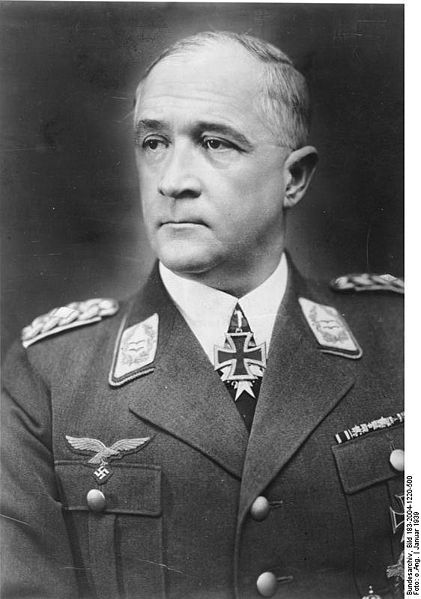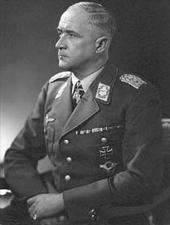<Back to Index>
- Biologist Julian Sorell Huxley, 1887
- Author Erich Maria Remarque, 1898
- Field Marshal of the Luftwaffe Robert Ritter von Greim, 1892
PAGE SPONSOR



Robert Ritter von Greim (22 June 1892 – 24 May 1945) was a German Field Marshal, pilot, army officer, and the last commander of the Luftwaffe (German Air Force) during the Second World War.
Born in Bayreuth, son of a Bavarian police captain, Greim was an army cadet before World War I and initially served in the artillery before transferring to the German Air Service (Fliegertruppe) in 1915.
While flying two-seaters in FFA 3b as an artillery spotter observer, Greim claimed his first aerial victory: a Farman, on 10 October 1915. He also served with FAA 204 over the Somme. After taking pilot training Greim joined FA 46b in February 1917.
Greim then joined Jagdstaffel 34 in April 1917. He scored on 25 May 1917, and became an ace by 16 August 1917. By 16 October, his victory tally totaled 7.
There was a lull in his successes until February 1918. On the 11th, he had an unconfirmed victory and on the 18th he notched up number 8.
In March 1918 he became CO of Jagdgruppe 10. His ninth victory came on 21 March 1918. He flew with them until at least 18 June, when he notched his 15th claim. In June 1918, Greim had an encounter with a Bristol Fighter, and his aircraft lost its cowling. This struck and damaged his top wing, along with the lower left interplane strut, but he managed to land the machine successfully.
By 7 August 1918 he was commanding Jagdgruppe 9, and scored his 16th victory. On 23 August, he cooperated with Vizefeldwebel Johan Putz in what was arguably the first successful assault by aircraft on armored tanks. On 27 September, he scored his final (and 25th) victory while flying with Jagdgruppe 9.
He returned to Jasta 34 in October 1918, after the Jasta had been equipped with 'cast-offs' from Jagdgeschwader (JG) I, the unit which had been commanded by Manfred von Richthofen until his death in action on April 21. Even though the machines were second hand, they were warmly welcomed by Jasta 34 as being superior to the older Albatros and Pfalz fighters that they had been previously equipped with. His final three victories came during this time.
By the war's end he had scored 28 victories, and had been awarded the Pour le Mérite on 8 October, as well as the Bavarian Military Order of Max Joseph (Militär - Max Joseph - Orden). This latter award made him a Knight (Ritter),
and allowed him to add both this honorific title and the style 'von' to
his name. Thus Robert Greim became Robert Ritter von Greim. After the war, Ritter von Greim was unsuccessful in finding a place in the Reichswehr, the 100,000 man army that the Versailles Treaty permitted
Germany. As a result he focused on a career in law, and succeeded in
passing Germany's rigorous law exams. However, he was asked by Chiang Kai-Shek's government to come to Canton, China, to
help build a Chinese air force. Ritter von Greim went with his family
to China where he founded a flying school and initiated measures for
the development of an air force. Ritter von Greim's opinion of his
Chinese pupils was not high, perhaps because of the contemporary belief
among Europeans that Asians were unable to operate complicated
machinery. He said in a letter that "The Chinese will never make good
fliers, they have absolutely no fine touch with the stick". Even before
the Nazis came
to power, von Greim realized that his proper place was not in the
expatriate community in China, but in Germany, and he returned to his
native country. In 1933, Ritter von Greim was asked by Hermann Göring to
help rebuild the German Air Force and in 1934 was appointed to the
command of the first fighter pilot school, following the closure of the
secret flying school established near the city of Lipetsk in the Soviet Union during the closing days of the Weimar Republic. (Germany had been forbidden to have an air force under the terms of the Treaty of Versailles of 1919, so it had to train pilots in secret.) In
1938, he assumed command of the Luftwaffe department of research.
Later, Ritter von Greim was awarded command of Jagdgeschwader 132 Richthofen (later JG 2), based in Doeberitz, a fighter group named after Manfred von Richthofen. When the war began, Ritter von Greim was given command of a Luftflotte (Air Wing) and was involved in the invasion of Poland, the Battle for Norway, the Battle of Britain and Operation Barbarossa. In late 1942, his only son, Hubert Greim, a Bf-109 pilot with 11./JG 2 "Richthofen" was listed as missing in Tunisia. He was shot down by a Spitfire flown by a Royal Australian Air Force pilot, but bailed out and spent the remainder of the war in a prison camp in the United States. Ritter von Greim's greatest tactical achievement was his Luftflotte's involvement in the battle of Kursk and his planes bombing of the Orelbulge. It was for this battle that Adolf Hitler awarded Ritter von Greim the Knight's Cross of the Iron Cross with Oak Leaves and Swords (Das Ritterkreuz mit Eichenlaub und Schwertern des Eisernen Kreuzes), which made him one of the most highly decorated military officers. On 26 April 1945, when Soviet forces had reached Berlin and the Reich was all but doomed, Generaloberst (Colonel - General) Ritter von Greim flew into Berlin from Munich with the noted female pilot (and also his intimate companion) Hanna Reitsch, in response to an order from Hitler. Their Fieseler Storch was hit by anti-aircraft fire over the Grunewald and Ritter von Greim was wounded in the leg. Reitsch took over the aircraft and landed on an improvised air strip in the Tiergarten near the Brandenburg Gate. Hitler promoted Ritter von Greim to Generalfeldmarschall (Field Marshal), making him the last German officer to achieve that rank, and then appointed him head of the Luftwaffe to replace Hermann Göring. Hitler had recently dismissed Göring in absentia for treason. Ritter von Greim thus became the second man to command the German Air
Force. However, with the end of the war in Europe fast approaching, his
tenure as Oberbefehlshaber der Luftwaffe lasted for only a matter of days. On 28 April, Hitler ordered Ritter von Greim to leave Berlin and have Reitsch fly him to Plön so that he could arrest Heinrich Himmler for treason. That night, they only just managed to get away, taking off from the Tiergarten strip before the eyes of soldiers of the Soviet 3rd Shock Army -
who initially feared they had just seen Hitler's escape. Later, in an
interview, both Ritter von Greim and Reitsch kept repeating: "It was
the blackest day when we could not die at our Führer's side." Then
they added as tears kept running down Reitsch's cheeks: "We should all
kneel down in reverence and prayer before the altar of the Fatherland."
When asked what the "Altar of the Fatherland" was, completely taken
aback, they responded: "Why, the Fuhrer's bunker in Berlin...."
On 8 May, the same day as the surrender of the Third Reich, Ritter von Greim was captured by American soldiers in Austria. Ritter von Greim was slated to be part of a Soviet - American prisoner exchange program and, fearing torture and execution at the hands of Joseph Stalin's NKVD, committed suicide in Salzburg, Austria, on 24 May. His final words before taking Potassium cyanide were: "I am the head of the Luftwaffe, but I have no Luftwaffe."